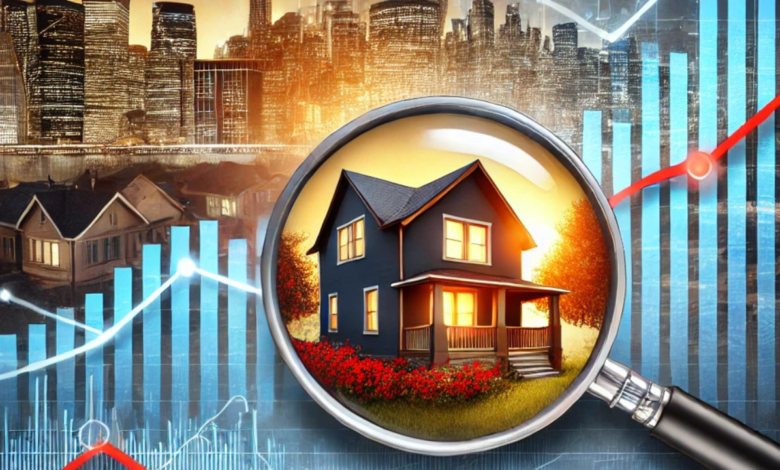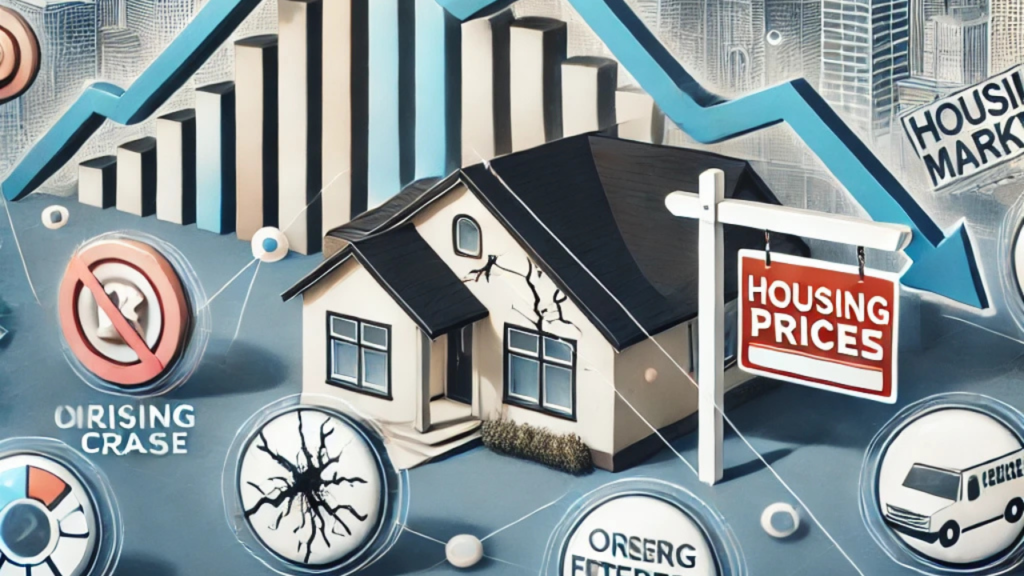Will the Housing Market Crash? A Comprehensive Look

Introduction
The housing market is a cornerstone of any economy, often reflecting broader financial health and societal trends. However, it is also prone to dramatic swings, with periods of booming growth followed by sharp downturns. A housing market crash, characterized by plummeting home values and widespread financial turmoil, can leave lasting impacts on homeowners, renters, and investors alike.
Historical events like the Great Depression and the 2008 financial crisis remind us of the severe consequences of housing market failures. This article explores the anatomy of a housing market crash, examines factors contributing to its occurrence, identifies current market signals, and delves into its potential effects. Understanding these dynamics allows you to better prepare for uncertainties and navigate the real estate landscape confidently.
The Anatomy of a Housing Market Crash
What is a Housing Market Crash?
A housing market crash occurs when property values decline rapidly across a vast region, often leading to economic instability. Factors such as overvalued homes, risky lending practices, and sudden demand shifts typically trigger these crashes. During a collision, homeowners may find themselves “underwater,” owing more on their mortgages than their properties are worth.
Such events disrupt financial systems, leading to tightened credit availability and reduced consumer spending. The ripple effects can extend beyond real estate, influencing employment rates and economic conditions.
Historical Examples of Housing Market Crashes
The Great Depression of 1929 marked one of the earliest significant housing crashes, fueled by economic collapse and widespread unemployment. Decades later, the 2008 subprime mortgage crisis sent shockwaves through the global economy. Risky loans and speculative home buying caused property values to collapse, triggering bank failures and financial instability.
Other regional crashes, such as Japan’s housing bubble in the 1990s, further underscore how varied the causes and consequences can be. Despite differences in triggers, the common theme is the devastating impact on financial stability and individual livelihoods.
Economic Ripple Effects
A housing market crash doesn’t occur in isolation. It often leads to job losses in construction, banking, and related industries. Consumer spending declines as financial insecurity rises. For governments, addressing the fallout can strain public resources, making economic recovery long and arduous.
Factors Contributing to a Housing Market Crash

Economic Conditions
Economic downturns, rising interest rates, and inflation significantly contribute to a housing market crash. When interest rates increase, borrowing becomes more expensive, reducing demand for homes. Inflation further erodes purchasing power, making homeownership less accessible.
Conversely, speculative buying can inflate property prices to unsustainable levels when the economy overheats, setting the stage for a crash.
Supply and Demand Imbalances
A mismatch between housing supply and demand often signals trouble. Overbuilding during booms can lead to surplus inventory, while housing shortages drive prices to unsustainable highs. Migration patterns and demographic shifts also influence this balance, exacerbating market volatility.
Policy and Regulation Failures
Poor regulatory oversight often causes housing crashes. The 2008 crisis, for instance, was partly caused by the deregulation of financial institutions, which allowed risky lending practices. Inadequate housing policies can further distort markets, leaving them vulnerable to shocks.
External Shocks
Unpredictable events like pandemics, wars, and natural disasters can disrupt housing markets. The COVID-19 pandemic, for example, initially led to a housing slowdown, followed by unexpected price surges driven by remote work trends and supply chain disruptions.
Signs to Watch for in the Current Market
Data Trends
Key indicators like declining home prices and increasing mortgage defaults are early warning signs of a potential crash. Tracking affordability metrics, such as the price-to-income ratio, can provide insights into market sustainability.
Economic Red Flags
Rising unemployment and stagnant wages create financial strain, reducing homebuyers’ ability to enter the market. Coupled with high housing costs, these conditions can precipitate a downturn.
Market Sentiment
Consumer confidence significantly impacts the housing market. When buyers hesitate due to economic uncertainty, demand drops, and accelerating price declines, monitoring investor behaviour, such as large-scale property sell-offs, can reveal underlying vulnerabilities.
Regulatory and Policy Indicators
Government actions, including changes in interest rates or housing subsidies, often signal shifts in market conditions. Central bank policies, in particular, play a critical role in determining housing affordability and market stability.
How a Housing Market Crash Could Affect You
For Homeowners
A crash can drastically reduce property values, leaving many homeowners with negative equity. This scenario complicates refinancing options and can lead to foreclosures. To mitigate risks, consider diversifying your investments and building an emergency fund.
For Investors
Real estate investors face both risks and opportunities during a market crash. While property values may decline, a downturn can also present opportunities to acquire assets at discounted prices. However, cautious due diligence is essential to avoid overleveraging.
For Renters
Renters may experience mixed outcomes. In some cases, rental prices drop as demand wanes. However, rents may remain stable or even increase in markets with low vacancy rates. Negotiating lease terms during a downturn can provide renters with financial flexibility.
For the Economy
The broader economy suffers during a housing crash, with reduced consumer spending and job losses compounding financial challenges. Recovery often requires significant government intervention, such as stimulus packages and housing market reforms.
Conclusion
The housing market’s volatility underscores the importance of vigilance and preparation. While predicting a crash with certainty is challenging, understanding the factors and warning signs can help individuals and businesses adapt. Whether you’re a homeowner, investor, or renter, staying informed and proactive is crucial to navigating the complexities of the housing market.
FAQs
What exactly causes a housing market crash?
Economic downturns, risky lending practices, and supply-demand imbalances typically trigger a collision.
How does a housing market crash affect home prices?
Home prices usually decline significantly, impacting property values and homeowner equity.
Can the government prevent a housing market crash?
While policies can mitigate risks, crashes often result from complex, interrelated factors beyond direct control.
Should I buy a house during a housing market crash?
It depends on your financial stability and investment goals. Crashes can offer opportunities for discounted purchases, but risks remain.
How long does the housing market recover after a collision?
Recovery times vary widely, often spanning several years depending on the severity and underlying causes of the crash.
What are the safest real estate investments during uncertain times?
Rental properties in high-demand areas and REITs (Real Estate Investment Trusts) tend to be more stable options.





